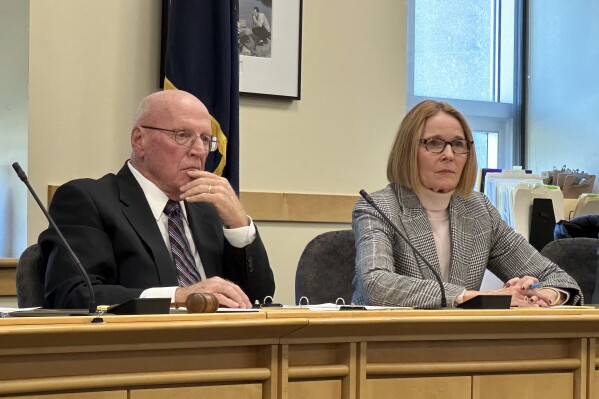Judge to review new settlement on ACLU of Maine lawsuit over public defenders
PORTLAND, Maine (AP) — State officials and a civil rights group have reached a new settlement to present to a judge for improving Maine’s system for providing attorneys for residents who cannot afford them, officials said Wednesday.
The same judge who rejected the original settlement in September must sign off to conclude the class-action lawsuit by the American Civil Liberties Union of Maine.
The new settlement agreement, reached by attorneys with help of a court-appointed mediator, aims to address the judge’s concerns including procedures for emergency relief for low-income residents left without an court-appointed attorney for a prolonged period.
It also sets a proposed timeline for opening public defenders offices, aims to improve data collection, and clarifies circumstances in which indigent clients can bring litigation in the future, according to the document.
 Maine island that was site of eviction of historic mixed-race community added to national register
Maine island that was site of eviction of historic mixed-race community added to national register
 Maine’s largest city votes down proposal to allow homeless encampments through the winter
Maine’s largest city votes down proposal to allow homeless encampments through the winter
 Commission investigating Lewiston mass shooting seeks to subpoena shooter’s military records
Commission investigating Lewiston mass shooting seeks to subpoena shooter’s military records
“We hope that the judge will give preliminary approval to the settlement,” said Zach Heiden, chief counsel for the ACLU of Maine.
Before rendering a decision, Justice Michaela Murphy will likely hold a hearing so she can questions attorneys about the agreement, Heiden said.
The ACLU of Maine brought the class-action lawsuit over shortcomings of the state’s public defender system, contending the state was failing to provide low-income Mainers with their constitutional right to effective counsel.
Before the hiring of five public defenders last year and additional funding for more lawyers this year, Maine was the only state without a public defender’s office for people who cannot afford to hire a lawyer.
The state had relied solely on private attorneys who were reimbursed by the state to handle such cases, and a crisis emerged when the number of lawyers willing to take court-appointed cases began declining.
All states are required to provide an attorney to criminal defendants who are unable to afford their own lawyer. A scathing report in 2019 outlined significant shortcomings in Maine’s system, including lax oversight of the billing practices by the private attorneys.
Heiden said the settlement addresses concerns with the Maine Commission on Indigent Legal Services but he challenged the judges, prosecutors, lawmakers and governor to continue the work of improving the system.
“All parts of our legal system have roles to play in addressing our indigent defense crisis,” he said Wednesday.
___
Follow David Sharp on X, the platform formerly known as Twitter, @David_Sharp_AP
Disclaimer: The copyright of this article belongs to the original author. Reposting this article is solely for the purpose of information dissemination and does not constitute any investment advice. If there is any infringement, please contact us immediately. We will make corrections or deletions as necessary. Thank you.





